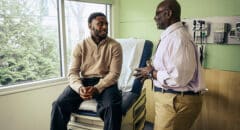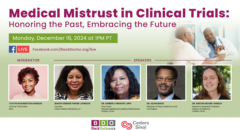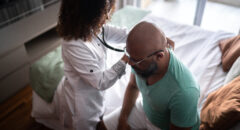 (BlackDoctor.org) — As the American population ages, the issue of elder abuse is something of which we should all be aware. And while elder abuse is a growing problem in some segments of the population, many of us may be unaware of some of the signs that abuse may be occurring. Looking out for our elderly neighbors, friends and family members is a societal and community responsibility, so knowing some of the basics can be a helpful starting point.
(BlackDoctor.org) — As the American population ages, the issue of elder abuse is something of which we should all be aware. And while elder abuse is a growing problem in some segments of the population, many of us may be unaware of some of the signs that abuse may be occurring. Looking out for our elderly neighbors, friends and family members is a societal and community responsibility, so knowing some of the basics can be a helpful starting point.
What Is Elder Abuse?
Elder abuse is an intentional or negligent act by any person that causes harm or the risk of harm to a vulnerable elderly individual. The broad categories of abuse are as follows:
Physical abuse: This can pertain to the infliction (or threat of infliction) of bodily harm, including depriving an elderly person of basic needs such as food, water, or adequate clothing. Note: Even the mere threat of harm still constitutes abuse.
Sexual abuse: Sexual contact of any kind that occurs without consent is a form of sexual abuse.
Financial abuse: A very common form of elder abuse that pertains to any aspect of the elder’s finances, including the withholding of funds, extortion, exploitation and other ways in which an elder can be taken advantage of financially.
Emotional abuse: This type of abuse involves the infliction of mental pain or distress of any kind. Withdrawal of affection or withholding of visits from grandchildren could constitute abuse in certain circumstances.
Neglect: As mentioned under physical abuse, the intentional withholding of food, clothing, shelter, medical care or other necessities of life is a form of abuse.
Abandonment: This form of abuse involves the desertion of a vulnerable elder by an individual who has assumed responsibility for that elder.
The Signs of Abuse
Some forms of abuse are easier to spot than others, so in some circumstances it can take a discerning ear or eye to uncover the presence of abuse.
Physical: Physical signs of abuse may include cuts, bruises, burns, broken bones, bedsores, as well as dehydration, unexplained weight loss, and poor hygiene. The abused or neglected elder may miss medical appointments, and have health maintenance needs that are left unmet for long periods of time. Prescriptions may go unfilled, and quality or availability of food may be impacted.
Behavioral : When emotional abuse is present, watch the elder for unusual signs of meekness, lack of eye contact, depression, anxiety, or extremely withdrawn behavior. Due to the mental decline that can occur with many elders, this form of abuse can be difficult to detect.
Financial: In terms of financial abuse, sudden changes in an elderly person’s financial situation may indicate abuse or exploitation.
Who Abuses the Elderly?
Abusers of the elderly can include family members, spouses, friends, hired caregivers, facility staff, or neighbors. While being suspicious of everyone is not recommended, the awareness that anyone can be a perpetrator is a sobering and disturbing thought.
Why Are Some Elders More Vulnerable Than Others?
Social isolation, loneliness, widowhood, depression, a history of domestic violence, mental illness, dementia or cognitive decline are some of the reasons why certain elders become vulnerable to abuse.
Who Do I Notify If I Suspect Elder Abuse?
State/County Agencies. The specific agency responsible for the investigation of elder abuse can vary from state to state, but many states or counties have an “Adult Protective Services” agency that handles such situations, and these services are sometimes provided by local elder care organizations.
The Police. The police are always a reliable place to turn, although you can also call your local senior center or United Way office for a referral to the appropriate agency. However, if you feel that an individual is in immediate danger, a call to 911 is essential.
“Helping Professionals.” Nurses, doctors, teachers, social workers and other professionals in the “helping professions” are considered “mandated reporters” in most states – even the suspicion of abuse is legally required to be reported by these individuals. Certain states may even require any citizen to report suspected abuse or neglect, let alone professionally mandated reporters.
Stopping Elder Abuse
The elderly are a treasure trove of stories, history and cultural memory, and they deserve all of our respect, love and protection, particularly from abuse, neglect and exploitation. Protecting the elderly is a communal effort, and as our society ages, there are more and more elders at risk of abuse by those who wish to perpetrate it.
There are many organizations that welcome volunteer involvement, from senior centers to the local United Way, and our collective involvement is essential.
Being a friend to elders in our communities, being knowledgeable about the signs of abuse, and educating others about the prevalence of elder abuse are all great places to begin eradicating elder abuse from our society.








